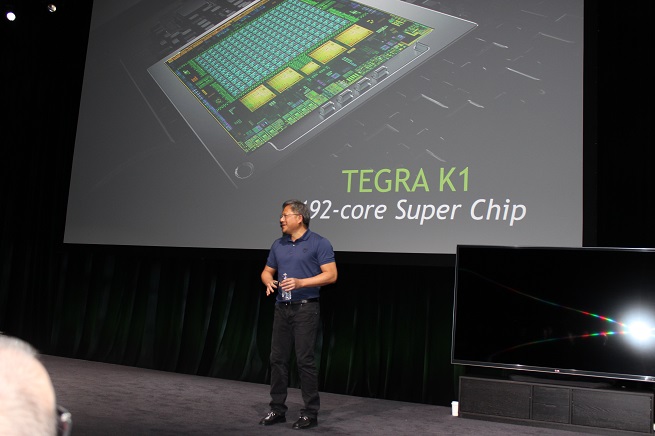Nvidia chief executive Jen-Hsun Huang announced tonight that the chip maker has designed the Tegra K1, a new “super chip” for mobile devices with 192 computing cores.
“We’ve brought mobile computing to the same level as desktop computing,” Huang said.
Nvidia made the announcement at a press event ahead of the 2014 International CES, the huge tech trade show in Las Vegas this week.
Huang said that games built with Epic Games’ Unreal Engine 4 will be able to run on Tegra K1 machines. That’s pretty incredible, as Unreal Engine 4 is being used to make today’s best PC and console games.
Tim Sweeney, chief executive of Epic Games, said that he didn’t think it would be possible to do such games on mobile for another four years.
The Tegra K1 is based on the Kepler architecture for 3D graphics that Nvidia originally created for desktop games. Huang said that mobile gaming is closing the gap with desktop games faster than ever before.
Nvidia showed a live demo of a scene Epic created in Unreal Engine 4, running on the Tegra K1 prototype hardware. In the demo, you could see real-time computer graphics on the mobile chip, with effects like shiny pipes, reflections on walls, sparks and shadows, and various particle effects. These kinds of graphics effects aren’t possible on today’s mobile devices, like the iPad.
Nvidia also showed a fantasy role-playing game running on the Tegra K1. The game had spectacular visuals. The Tegra K1 is more powerful in both graphics horsepower and central-processing horsepower than either the Xbox 360 or the PlayStation 3, Huang said. It can also run Epic Unreal Engine 4 at three times faster than an iPad with Apple’s A7 chip.
“We are just so far ahead at this point,” he said.
Huang said Tegra K1 comes in two versions. One is based on the Nvidia secret project, code-named Denver, which is a full custom CPU based on the ARM architecture.
The less powerful version is a 32-bit chip with quad A15 CPUs, running up to 2.3 gigahertz.
Tegra K1 will also come with a dual-core Denver CPU. Huang said, “I know what you’re thinking. ‘This is probably a PowerPoint launch. But Tegra K1 has been back for a few days” with prototypes based on the Denver CPU.
The dual-core Denver CPU is a 64-bit ARM-based chip running at 2.5 gigahertz.
Patrick Moorhead, an analyst at Moor Insights & Strategy, said, “Nvidia’s Tegra K1 could be a force to reckon with in the mobile world. The K1 brings PC-level, Kepler-based graphics and a custom, 64-bit processor core to smartphones and tablets. On paper, this is really strong and we will need to see its performance inside a mobile device, its battery life, and how it pairs up with an LTE modem before anyone can render a final verdict.”
VentureBeat's mission is to be a digital town square for technical decision-makers to gain knowledge about transformative enterprise technology and transact. Learn More

